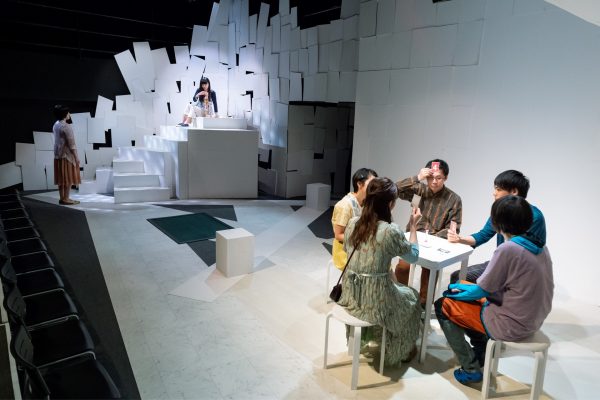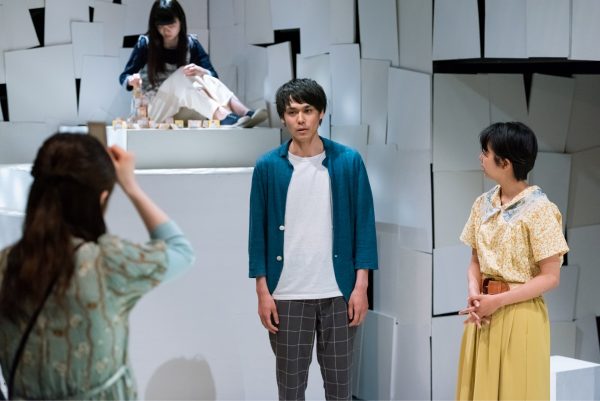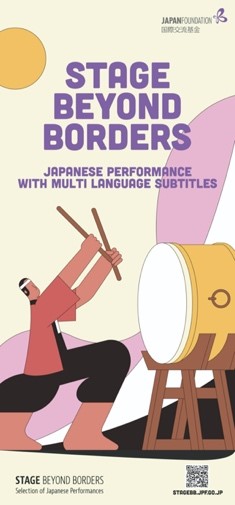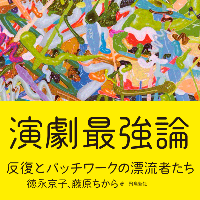【連載】ピックアップ×プレイバック 藤原ちから編(2019/06)―ジエン社『ボードゲームと種の起源・拡張版』
ピックアップ×プレイバック
2019.06.28
作品を観た数だけ、綴りたい言葉がある。
いま、徳永京子と藤原ちからが “ピックアップ” して “プレイバック” したいのは、どの作品?
*English is bellow the picture, you can translate into your language easily.
2019年06月 藤原ちからのピックアップ×プレイバック ⇒ジエン社『ボードゲームと種の起源・拡張版』
作・演出:山本健介
2019/5/29[水]~6/9[日]
東京・こまばアゴラ劇場
批評家は今や絶滅危惧種である。にもかかわらず、彼らを保護する声より糾弾する声のほうが大きい。しかたないかな、とも思う。そもそも嫌われてナンボの仕事だし、傲慢な態度のわりに大した仕事もしない人たちもいただろうから。もし、批評家が新しい時代にも生き残るとすれば、古い殻を捨て、作家や作品と同時代に生きるひとりの人間へと脱皮しなくてはならない。けれども、周囲の期待やプレッシャーに屈する必要はない。ひたすら、みずからの矜持を示しつつ仕事を重ねていけばいい。例えばこんな意見に対してもそうだ。「褒める言葉ばかりが横行している。プロの批評家にはきちんと良し悪しをジャッジして書いてほしい。」
褒める言葉ばかりが目立っているのは事実だと思う。けれどもわたしの信念では、批評はただ作品の良し悪しを判断する審判ではない。ジャッジは、数々の厳しい修羅場をくぐり抜けてきた批評家にとってはごく初歩的な技術でしかない(そのジャッジを表明する勇気や時間があるかどうかという別の問題があるとはいえ)。それに「☓☓☓は良かった/悪かった」という短絡的な意見表明は、今流行りの、なんでも「正義/悪」に峻別してしまう幼稚な正義感に与することにもなりかねない。むしろ価値観の多様化したこの世界において、混沌を混沌として見つめ、そこからかろうじて可能な言葉を引きずりだして世に問うていく。そっちのほうが難しいし、やる意味があるし、心も燃える。
▼散漫な印象、しかし……
ジエン社の『ボードゲームと種の起源・拡張版』を東京で観た。ジエン社は何度か観ていて、特に深夜ラジオを題材にした『夜組』(2017)には、心の奥底にある何かを揺さぶられたのだが、今回の『ボードゲーム〜』ではそのような強い印象は受けなかった。しかし、つまらなかったわけではない。何か惹かれるものがあったのは確かだ。
不満が残った最大の要因は、テーマが多岐にわたりすぎたことかもしれない。東京の炎上、夫婦の愛情、転居に伴うエトセトラ、社会から排除された人のこと……それらがうまくひとつの像を結ばなかった。彼らが得意とする「同時多発会話」も、今回は技巧的なギミック(今作で言うところの「フレーバー」)に終わってしまったように思う。
その一方でわたしは、この人たちにはぜひ演劇を続けてほしいとも思ったのだった。ジエン社の作家(山本健介)がその戯曲において、「ボードゲーム愛好家」という特殊なコミュニティ/クラスタを扱う手付きにも好感を抱いた。一般的に劇作において、どこかのコミュニティ/クラスタを取り上げることには、常に倫理的な危険がつきまとう。そのコミュニティ/クラスタに生きる人々を、作品の「ネタ」として消費してしまうこともありうるからだ。というか大なり小なり、作品は誰かを消費する。そのことをどう引き受けるかが、作家の倫理だとわたしは思っている。今回のジエン社は、ボードゲーム愛好家たちを特殊で奇妙な人たちとして捉えるのではなく、ごく身近な隣人として描き出そうとしていたように思うし、わたしはそこにこの作家の倫理を感じることができた。
それと関連して興味を惹かれたのは、劇中でボードゲームを考案している青年(寺内淳志)が「誰に向けてゲームをつくるのか?」と煩悶する姿である。もしも「ゲーム」を「演劇」に替えれば、それは劇作家自身の悩みともシンクロしそうだ。「誰に向けて演劇をつくるのか?」……いや、劇作家のみならず、演出家も、俳優も、制作者も、ドラマトゥルクも、舞台美術家も、音響家も、照明家も、舞台監督も……要するに演劇創作に関わる人たちすべてが、この問いを避けては通れないだろう。
誰に向けて演劇をつくるのか?
そして、どんなふうに?
▼「弱さ」について
この作品には、ゲームへの参加を拒絶する女(湯口光穂)が登場する。「私、ゲームできません。みんなと一緒に何かするのが苦手だから……」と言いながらも、彼女はなぜかこのゲーム愛好家たちの集まりに出入りしている。「怪物」と書かれたカードを持っているこの不思議な女は、一種の「サークル・クラッシャー」であることを匂わせている。つまりこのサークル内の習慣や秩序を撹乱しかねない存在として登場するのだ。と同時に彼女は、社会やコミュニティから排除され、居場所を奪われた弱い人間であるようにも見える。その「弱さ」は、「私はできたよ。私は変われた」と言ってのける、ボードゲーム界の「妖精」であった女(高橋ルネ)とは対照的に描かれてることによって、際立っている。
話が脱線してしまうのだが、この「怪物」の女を見て、最近のいくつかの凶悪事件を思い浮かべた日本の観客もいたのではないだろうか。少なくともわたしはそうだった。5月の終わりに、いわゆる「ひきこもり」だった51歳の男が、小学生の群れを襲うというショッキングな殺人事件が起こった。その数日後には、76歳の老人がやはり「ひきこもり」だったとされる44歳の息子を殺すという別の事件も起こった。このため日本のメディアは「ひきこもり」関連の話題でもちきりになった(それも一瞬のことで、すでに忘れ去られようとしているが……)。経済成長と競争社会を煽ってきた日本が、その陰で見ないことにしてきたひずみが、マグマとなって噴出しているのかもしれない。ただしこうした現象は今に始まったことではない。演劇では岩井秀人(劇団ハイバイ)が、みずからが「ひきこもり」であった経験をもとに2003年から作品をつくってきた。わたしはハイバイの演劇を、この社会に生きづらさを感じている人たちにこそ観てほしいと願ってきた。それはかつてわたし自身がハイバイの演劇を観て、眠っていた怨念や暴力性を解きほぐされ、救われたように思うからだ。あれは表層的な癒やしなんかではなく、もっと深い生まれ変わりの体験だった。
昨年、演劇ジャーナリストの徳永京子さんが、そのハイバイを源流とみなすことで、日本現代演劇の若い世代の傾向のひとつを「弱いい派」と名付けた。彼女によればこの「弱いい派」は、「糾弾や復讐、戦いではなく、毅然と、あるいは柔らかく、『弱いですけど、それが何か?』と問いかけて相手との関係をフラットにし、見下そう、切り捨てようとする先方を脱臼させる」。また、ダンス批評家の桜井圭介さんは「メンヘラに優しい演劇」と題された最近の文章の中で、「弱いい派」でさえその舞台上の身体は強すぎると述べ、もっと「威圧感(攻撃性)」のない身体に注目しようと試みている。2人の主張は微妙に異なるけれども、どちらも、これまでの日本社会ではネガティブなものとされてきた「弱さ」を、ポジティブな価値として捉え直すという点では共通している。
わたし自身、舞台に立つ俳優にとっては「ヴァルネラビリティ(傷つきやすさ)」が重要だ、と説いたことがある(書籍『演劇最強論』2013年)。けれども、「弱いい派」や「メンヘラに優しい演劇」のアイデアをそのまま受け入れることには正直言ってまだ抵抗がある。それはわたしがアジア各地において、なんらかの主張をせずには生きていけない人々の姿を日常的に見ているせいかもしれない。そこではサバイブするための「強さ」がどうしても必要だし、さもなければ殺されかねないという切迫感が漂っている。もしも「強さ」という言い方がふさわしくなければ、「たくましさ」と「したたかさ」、あるいは「生命力」と「戦略性」と言い換えてもいい。わたしも日本で生まれ育ってきたので、今の日本の不寛容で攻撃的なギスギスした状況とその背景は理解できし、この国がもはや「安全」なんかではないことも承知している。しかし重要なのは「弱さ」そのものよりも、その「弱くてもいい」あり方を提示しようとする「意志」や「戦略」のほうではないだろうか。例えば「弱いい派」として贅沢貧乏や範宙遊泳の名前も挙がっているが、わたしはむしろ彼らが中国や他のアジア諸国で現地のアーティストたちとコラボレーションしているタフさのほうにむしろ惹かれてしまうのだった。徳永さんのアイデアについて言えば、「先方を脱臼させる」というその意志や戦略にこそわたしは関心があるので、「弱いい派」という呼称が「弱さ」を強調してしまうことに違和感があるのかもしれない。また一方で、桜井さんが「親しみ」を感じたという俳優たちの身体やムーブメントについては、いったいそれらがなぜ観客の心を捉えるのか、より詳細な考察や議論を待ちたい。おそらく「メンヘラ」なのは桜井さんだけではない。日本にいる人たちの多くが「メンヘラ」に追い込まれており、その状況に対して、新しい身体やムーブメントが模索されているということではないだろうか。
こうした議論を踏まえた上で、あらためて今作のジエン社の俳優たちの演技を思い返してみる。彼らのたたずまいは、よるべない。正直に言うと、覇気がない、と感じた。だけどもちろん、覇気によって作品の「強度」を保とうとかいう方向性が正しいとは思わない。彼らのよるべなさは、今の日本のリアリティに迫るために必要なものではあるのだろう。
だからこそ、劇中で数分間続いた沈黙の場面がわたしは気になっている。できればあのシーンをもう一度観てみたいのだが、そこだけ抜き出しても成立はしないだろう。つまり、あの重要な場面を支えていたのは、それを演じた2人の俳優(須貝英と善積元)だけではないということだ。作品全体を通して同時多発的に語られていたすべての饒舌な会話が、あの失語のシーンへと結びついていたはずだ。いったいなぜ、彼らは言葉を失わざるをえなかったのか……?
この失語のシーンは、今の日本の状況そのもののようでもある。わたし(たち)は毎日のように失語している。言えない。あるいは、何か言葉を口にする気を失ってしまうような状況に、日々、直面させられている。この不満は、言葉にできないがゆえに、共闘の可能性もかぎりなく少ない。確かに怒りを口にする(=SNSに書く)ことを日本人は覚え始めてはいるし、それは社会をより良く変えるために重要かもしれないが、他人の声に耳を傾けようとする人は少なく、異なる意見を持つ人同士の対話の場も作法もほとんど用意されていない。そして日々、多くの人が傷ついている。なんてひどい社会になってしまったのだろうと思うけれども、経済発展と自身の幸福ばかりを追い求めてきた日本人の長年のツケが今溜まっているということなので、すでに破綻しつつある国民年金と同じく、今の若い世代にそれを支払う責任も義務もないとわたしは思う。しかしながら、もしもこの先も日本で生きていこうと考えるのであれば、「オトナたちがひどいことにしてきたので私は知りません」と知らんぷりするわけにもいかない。この社会の修復もしくは再生には、長い長い時間がかかるだろう。徳永さんが言うように、「弱いい派」が戦おうとしているのはこの長い長い時間に対してなのかもしれない。
▼誰に向けて演劇をつくるのか?
さて、ここまで「弱さ」をめぐって考えてきたけれど、別の問題もある。それは、こうして劇場の中で演劇作品をつくったとして、果たしてそれを切実に必要としている人たちに届くのかということだ。先ほどの問いがまた繰り返される。
誰に向けて演劇をつくるのか?
そして、どんなふうに?
今の日本において、人が、劇場にたどり着くまでのハードルはかなり高い。仮に客席に座ったとしても、現代演劇特有のスタイルをいきなり受け入れるのは簡単ではないかもしれない。特にジエン社の同時多発会話は、興味深い試みではあるとはいえ、現代演劇に慣れていない観客にとって最初から馴染みやすいものとは思えない。わたしは、「これから現代演劇を観てみたいけど、何を観たらいいですか?」と言う人がいたら、「せめて3種類のカンパニーは観てほしい」と答えてきたが、それはそこそこの余裕がまだありそうな人に対してである。たったの1回しかチャンスがない、それが生き死にを分けるかもしれない、という人に対しては、わたしには何ができるのだろうか?
先日シンガポールで開催されたADN(Asian Dramaturg Network)で、演劇批評家の内野儀氏が「アセンブリーとしての劇場」をテーマに講演し、日本におけるいくつかの試みが紹介された。Q&Aセッションでは、この講演に対していくつかの批判的な意見が出た。わたしの理解では「アセンブリー(集まること)を劇場の中だけに限定していいのか? それだとミドルクラスの観客が集まるだけにならないか?」というのが主な批判だったと記憶している。わたし自身も「だから、アーティストたちの多くはすでに劇場を飛び出しているのでは?」という意見を述べた。内野氏はそれらの指摘に対して理解を示した上で、「ミドルクラスと呼ばれる人々の中にも見えない観客がいるはずだ」と返した……と記憶している。「見えない観客」という言葉はわたしにとって印象的だった。その中には、今日にも自殺しようと考えている人や、明日こそは誰かを殺さなければ……と思い詰めている人も含まれているかもしれない。
ジエン社は、その「見えない観客」の来場を信じていたのかもしれない。象徴的だったのは、「怪物」のカードを持ったあの女が自撮りするシーンだ。彼女は客席がカメラのフレームに入るように何枚かセルフィーを撮った。最前列にいたわたしは自分の姿がばっちり映っているのが見えた。だが、その後ろはどうだったろう? 後ろの席にどんな観客がいたのかはよく見えなかった。もしかしたらその暗闇の中に、「見えない観客」がいたのかもしれない。もしかしたら……。
もしかしたら、というその不確かな可能性に賭ける行為は「投瓶通信」にも似ている。古来から物書きや芸術家は、メッセージを入れた瓶を投げ、それを知らない誰かが拾ってくれる可能性に賭けてきた。しかし今、演劇の作り手がその「投瓶通信」に賭けるとしたら、いったいどれだけの勝算がそこにはあるのだろう? それこそ劇中でゲームデザイナーの青年が忌避していたような、サイコロの運に任せるような行為になってはいないだろうか。もっと、何か、できることはないのだろうか。
一般的には、とにかく観客数を増やすことによって「投瓶通信」の成功確率をあげようとする考え方もある。ごく一部の愛好家だけに観客を限定するのではなく、もっと一般人に開かれた表現にしなければダメだ、という考え方である。これは非常に根強い考えであり、演劇における商業主義を正当化する根拠にもなっている。「一般に開かれたものにする」=「大きな劇場が必要」=「そのキャパを埋めないといけない」=「有名人をキャスティングする」という図式である。しかしこの考え方はおそらくバブル経済期に端を発するものであり、今となっては古いものであるとわたしは思う。商業的なマーケットに接続することでパイを拡大しようとしても、本当に救いを必要としている「見えない観客」はむしろそんな場所には行かないのではないだろうか。彼/彼女は、高い観劇料を払って芝居を見物に来る人々のあいだに自分の身を置きたいと思うだろうか? そもそも、そんな高いチケット代を払えないだろう。だったら家にこもってネットをいじっているほうがいい……。正直わたし自身も暗い時代を過ごした経験があるが、その頃、陽の当たる場所に行きたいとは到底思えなかった。劇場は物理的には陽の当たらない場所だが、やはり大きな劇場は、そこそこお金に余裕のある人がおめかしして行くような華やかな場所なのだ。
ジエン社の今回のメンバーたちが将来的に、カンパニーとして、あるいは個々の演劇人として、どのような方向性を目指しているのかわたしは知らないが、少なくとも今作は小劇場(こまばアゴラ劇場)を舞台にしていた。そして劇中に登場するボードゲームを、終演後に観客とプレイする回も設けていたようだ。残念ながらわたしはその回を目撃できなかったけれども、そこにはごく小規模な親密な空間だからこそ生まれる「アセンブリーとしての劇場」の可能性があったのかもしれない。もしかしたら、ふだん演劇はまったく観ないけれども、ボードゲームを題材としているからという理由でふらりと劇場に来た人もいたかもしれない。
しかし……次のような荒唐無稽な問いも浮かぶ。ゲームだけではダメだったのだろうか? 自家製のゲームをつくって、それを観客と一緒にやってみる、というだけではダメだったのか。自問自答してみる。
「いやー、それはアカンでしょ」
「なんで?」
「演劇にならないから」
それはそうだ。しかし、なぜ演劇じゃなきゃダメなんだろうか。演劇をやりたいからだろうか? 演劇しかできないからだろうか? もちろんわたしは、ゲームだけにしたほうがいいとは全然思っていない。でも、だとしたら、演劇にはどんなポテンシャルがあるのか。それを考えたい。
もしも演劇よりも効果的な(彼らがやりたいことに近づける)方法があったら、「演劇」というフォーマットは惜しげもなく捨てるだろう、というアーティストたちをわたしは知っている。実際、演劇の経験を活かすことで新たな方法を実践している人たちもすでにいる。もちろん、演劇というひとつの道をひたすら続けることによって到達できる技術や思想もあるだろう。しかしもしも、そのような究極の地平を目指すとするなら、なおさら大事なのは、「演劇」というフォーマットの上に漫然と乗ることではなく、演劇の歴史の流れを捉え、その波を乗りこなすことのほうではないだろうか?
(観劇日、2019年6月9日17時、こまばアゴラ劇場)

撮影:刑部準也
Chikara Fujiwara’s Pick up X Play back ⇒The end of company “The Board Game and the Origin of the Species, Extended Version”
Critics are now endangered species. Nevertheless, the voice to protest is bigger than to protect them. I think this situation is unavoidable. Critics are always hated, and some critics were just arrogant but did not work. If a critic survives in a new age, he/she has to throw away the old shell and turn into a human who lives with artists and their works in the same era. However, a critic should not submit to the expectations and pressures of others. He/She just has to continue the works while showing his/her own dignity. For example, there is an opinion like this: “Only praise words are rampant. We want professional critics to judge good or bad.”
I agree the fact that only praise words are rampant. But in my belief, critique is not just to judge to good or bad. Judgement is an elementary technique for critics who have come through a number of tough situations (even if there is another issue whether they have the courage and time to express it). Besides, such a short-cut judgement like “XXX is good / bad” may also be involved in the prevalent childish sense of justice to “justice / evil”. Rather, in this diversified world, critics should stare at the chaos, then pull out some possible words and throw them to the world. It’s more difficult, meaningful, and passionate.
▼Discursive impression, but…
I watched “ボードゲームと種の起源・拡張版 (The Board Game and the Origin of the Species, Extended Version)” of ジエン社 (The end of company) in Tokyo. I’ve been watching the theater pieces of The end of company several times, and in particular, “夜組 (Yorugumi, 2017)”, which focused on mid-night radio, shook something deep inside my heart, but in this “The Board game ~” I didn’t receive such a strong impression. But it was not boring. It was certain that something was attracted.
The biggest factor for this dissatisfaction may be that the themes were too many. For example, collapse of Tokyo, love of husband and wife, a person excluded from society…etc. They couldn’t form an image well. The way of “simultaneous conversation”, which they use often in their theater pieces, was just a technical gimmick (like a “flavor” as they said in this piece).
On the other hand, I wanted these people to continue to create theater. At least I liked how the playwright (Kensuke Yamamoto) treated the specific community / cluster “board game lovers” in his play. In general, in dramatization, taking up any community / cluster always involves ethical dangers. It’s possible that people living in the community / cluster may be consumed as a “material” of the work. Rather, the works consume someone always. I think it’s the writer’s ethics how to accept this fact. This time The end of company draw out board game lovers as our very close neighbor rather than as strange people. I could feel the ethics of this playwright at this point.
Related to that point, I was attracted by a young man who is inventing a new board game in the play (Koji Terauchi), who bothers “Whom do I make a game for?” If you replace “game” with “theatre”, it seems to synchronize with the playwright’s own conflict. “Whom do I make theater for?” …No, not only playwrights, but also directors, actors, producers, dramaturgs, scenographers, sound engineers, lighting engineer, stage managers, and so on… All those involved in theatrical creations can not avoid this question.
Whom do I make theater for?
And how?
▼About “weakness”
In this work, a woman who refuses to participate in the game appeared (Mitsuho Yuguchi). Even though she said, “I can’t play games. I’m not good at something to do with others…”, she was somehow going into this gathering of board game lovers. This mysterious woman with a card with the word “monster” hinted that she was a kind of “circle crusher” as well. In other words, she appeared as an existence that might disturb the customs and order in this circle. At the same time, she appeared to be a weak person who has been excluded and robbed of her place from the society and communities. This “weakness” was emphasized in contrast to a girl who used to be called a “fairy” in the board game world (Rune Takahashi) who says “I could do it. I’ve changed myself.”
Although the topic will be derailed, some Japanese audience might reminiscent of some recent violent incidents when they look at this “monster” woman. At least I did. At the end of May, there was a shocking murder incident in which a 51-years-old man, who was a so-called “hikikomori (ひきこもり, who cannot commit to any social sections and almost of them cannot go out from their home)” attacked elementary school children. A few days later, another incident occurred in which a 76-years-old man killed his 44-years-old son who was also recognized “hikikomori”. For this reason, Japanese media treated on these topics related to “hikikomori” everyday (however, that was only a momentary trend. This topic is now already forgotten…). The strain that Japan, which has embraced economic development and competitive society, has concealed might be expanding and exploding as magma. However, such a phenomenon is not something that has just begun. In theater, Hideto Iwai (ハイバイ, hi-bye) has been making works since 2003, based on his experience that he was a “hikikomori”. I’ve hoped that those who feel difficulties in this society should watch the theater pieces of hi-bye, because I was rescued from my resentment and violence when I once watched hi-bye. I think that was not a superficial healing but a deeper reborn experience.
Last year, the theater journalist Kyoko Tokunaga regarded one of the tendencies of young generations of Japanese contemporary theater as descendants of hi-bye, and she named it“弱いい派 (yowaii-faction, it means that weakness is OK)”. According to her, this “yowaii-faction” is, “They don’t want grenades, revenge or battles, and just ask stably or softly ’Yes, I am weak. Are you worried about that?” for trying to flatten and dislocate the relationship with the others who look down and cut off people. In addition, the dance critic Keisuke Sakurai recently wrote an article entitled “menhera-friendly theater”(*”menhera” means people who have difficulties with their mental health), he insists even in “yowaii-faction” the actors has too strong bodies on the stage, so he tried to focus less “overbearing (aggressive)” bodies. These two critics’ ideas seem different slightly, but they both share the point of reconsidering “weakness” as a positive value, which has been regarded as negative in Japanese society,
For myself, once I’ve insisted that “vulnerability” is important for actors on the stage (Book of “Engeki Saikyo-ron”, 2013). However, to be honest, I still feel reluctant to accept their idea of “yowaii-faction” and “menhera-friendly theater”. It may be because everyday I see people in various parts of Asia who can not live without opinions. They need “strength” absolutely to survive, otherwise they might be killed. If you feel the word “strength” is not appropriate, I can rephrase as “toughness” and “wiseness”, or ”vitality” and “strategy”. Since I was born and raised in Japan, I can understand the current situation and backgrounds of Japan’s intolerance and aggression, and I’m aware that this country is no longer “safe”. However, the important thing is not the “weakness” itself, but the “will” or “strategy” to present the way of “weakness is OK”. For example, although the names of 贅沢貧乏 (ZEITAKU BINBOU) and 範宙遊泳 (HANCHU-YUEI) are listed as “yowaii-faction”, I am rather attracted to their toughness which leads them to collaborate with local artists in China and other Asian countries. As for Kyoko Tokunaga’s idea, I am interested in the will and strategy of “dislocating the others”, so I’m afraid that the name “yowaii-faction” emphasizes “weakness” too much. On the other hand, I would like to wait for more detailed thoughts and discussions, why the body and movement which Keisuke Sakurai felt “intimacy” can capture the hearts of audience. Perhaps “menhera” is not only Mr. Sakurai but also most of Japanese people. For this situation, the new body or movement might be seeking.
Based on these discussions, I will re-evaluate the performance of the actors of The end of company. Their behavior were unstable. To be honest, I felt they had not enough spirits. But of course, I don’t think they should maintain the “strength” of the work by their spirits. Their unstable conditions will be necessary to approach the reality of Japan today.
That’s why I am interested in the silence which continued for a few minutes in this theater play. I would like to watch the scene again if possible, but we cannot pick up only that scene. In other words, not only those two actors (Ei Sugai and Gen Yoshizumi) supported that important scene. All the talkative simultaneous conversation should have been linked to that aphasia scene. Why should they lose their words…?
This aphasia scene is also like the current situation in Japan. I am (we are) aphasia every day. I can not say anything, or, I am faced with a situation where I lose my motivation to say something. Because this dissatisfaction can not be described in words, there is almost no possibility of solidarity. Certainly nowadays, Japanese people are starting to learn anger (by writing on SNS), which may be important to change the society more better, but only few people listen to others’ voices, and there is almost no place or way for dialogue between people with different opinions. Many people are hurt or injured every day. What a terrible society. I think there is no responsibility or obligation of the younger generation to pay like the national pension which is already breaking down, because this is the long-standing debt of the old Japanese who have pursued only the economic development and their own happiness. However, if we intend to live in Japan, we can not say only that “I have no idea because adults have made it awful.” It will take a long long time to restore or regenerate this society. As Kyoko Tokunaga says, “yowaii-faction” may be trying to fight at this long long time.
▼Whom do we make theater for?
By the way, I’ve considered “weakness” so far, but there is another problem. That is, if we make theater pieces in theater buildings like this way, can the theater reach the people who really need them? The previous question is repeated again.
Whom do we make theater for?
And how?
In Japan today, the hurdles for people to reach the theater are quite high. Even if they sit in the audience seats, it will not be easy to accept the particular style of contemporary theater suddenly. In particular, although the simultaneous multiple conversations of The end of company is interesting attempt, it doesn’t seem to be familiar for beginner audiences who never watch contemporary theater. Sometimes people ask me “If I watch a contemporary theater, which company should I watch?” I often answered, “Please watch at least three types of companies”. But that was for those who are rich and safe so so. For those who have only one chance which might divide the life or death, what can I do?
At the ADR (Asian Dramaturg Network) in Singapore, theater critic Tadashi Uchino spoke on the theme of “Theatre as Assembly” and introduced several attempts in Japan. In the Q&A session, some critical comments came out for this talk. In my understanding, I remember that the main opinion was “Do you limit assembly only in the theater? If so, only middle-class audiences can gather?” I also commented “Therefore, many artists already chose their way out of the theater”. Mr. Uchino showed understanding to those points and said, “There should be an invisible audience among the people called middle class”. I was impressed this word “invisible audience”. Among them, there might be those who are thinking suicide today, or those who are thinking killing someone tomorrow.
The end of company may believe in the arrival of the “invisible audience”. The iconic one is a scene that the woman with the “monster” card took selfie. She took some selfies to get the audience into the camera frame. I was in the front row, then I saw my figure was inside the frame. But how was that behind me? It was not possible to see what audiences were in the back seats. Maybe there was an “invisible audience” in the dark. Maybe…
Maybe. This act of betting on that uncertain possibility is similar to “message in a bottle”. Since ancient times writers and artists have thrown bottles with messages and bet on the possibility that unknown someone will pick them up. But now, if a theater maker bets on the “message in a bottle”, can he/she get victory? As it was suggested by the young man who created board games, it’s unreliable like a luck of dice. Is there anything we can do more?
In general, some people think to raise the success probability of “message in a bottle” by increasing the number of audiences. They think “It’s bad way to limit the audience in only a few enthusiasts, and we should make our expressions more open to the general public”. This is a very persistent idea, and is also the basis for justifying commercialism in theater. The scheme is “make it open to the public” = “requires a large theater” = “fill the capacity” = “cast a famous person”. However, this idea originates in the bubble economy in Japan, so now it seems already old. Even if you try to expand the pie by connecting to a commercial market, “invisible audience” who really needs salvation will probably not go to such a place. Does he/she want to put themselves in the middle of the people who come to see theater by paying expensive tickets? At first, they can not buy such expensive tickets. They want to stay at home and play on internet… Honestly, I was also in the darkness in my young age, at that time, I almost never wanted to go to a sunny place. Theater is not physically sunny, but a big theater is a glamorous place for people who have enough money.
I do not know what direction this member of The end of company aim in the future, as a company or as an individual theater person. Bt at least this work is in a small theater (Komaba Agora Theater). They set some opportunities to play the board game with the audiences after the performances. Unfortunately I could not join the occasion, but there may be the possibility of “theatre as assembly”, born from a small intimate space. Maybe some people who have usually never watched theater might come because of the interesting for board games.
However… The following rough and innocence question also comes up. Doesn’t it work by only the game? Is only playing the original game with audiences useless? I am asking myself.
“No… It’s bad.”
“Why?”
“It cannot be a theater.”
That’s right. Why are you particular about theater? Is it because you want to play theater? Is it because only theater you can do? Of course, I don’t think they should just play games. But then, what kind of potential does theater have? I want to think about it.
I know some artists who will throw away the format of “theater” without hesitation if they find out more effective way which is more closer to what they want to do. In fact, some artists are already practicing new methods by using their theater experience. Of course, there will also be technics and thoughts that can be reached by continuing only theater. But if you are aiming for such an ultimate horizon, the important attitude is not sitting on the format of “theater”, but capturing the flow of histories of theater and surfing it.
(June 9, 2019, Komaba Agora Theater)

撮影:刑部準也



